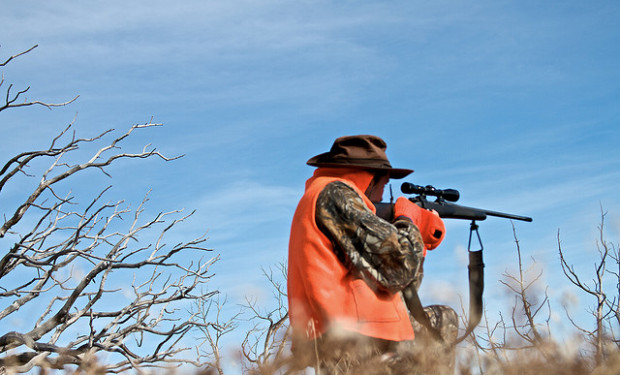State Senate Targets Sunday Hunting Ban
Bills introduced by both the North Carolina Senate and House of Representatives would allow hunting on Sundays, with some restrictions.
This article is part of a series on bills currently under consideration by the North Carolina General Assembly. You can also read about bills related to clarifying contempt laws and selling the Dorothea Dix property here.
“Blue” laws in North Carolina are most commonly known for prohibiting the sale of alcohol on Sundays. The only other remaining blue law in North Carolina relates to hunting with a firearm on Sundays. Hunting with a firearm on Sundays has been banned by state law since 1868, though Sunday bow-hunting was legalized in 2010. At present, eleven states either ban or restrict hunting on Sundays. North Carolina Senate Bill 658, titled “An Act to Allow Hunting on Sundays With Certain Limitations,” and House Bill 640, titled the “Outdoor Heritage Act,” would allow most hunting with a firearm on Sundays. Both bills are currently before the state Senate.
The staunchest critics against lifting the ban on Sunday hunting consisted mainly of churches and farmers. One of the concerns the critics expressed is the disruptiveness of gunfire noise. To alleviate this concern, SB 658 prohibits hunting of waterfowl on Sundays, hunting with dogs on Sundays (the main concern here appears to be hunting deer and bears with a pack of dogs, which can be very noisy), and hunting within 250 yards of a place of worship before 1 PM on Sundays. The North Carolina Wildlife Commission would also be able to prohibit Sunday hunting at certain times or in certain locations as it deems necessary. This exact same conflict was seen in Virginia last year, which passed a law with restrictions very similar to SB 658.
HB 640 is more restrictive. Passed by the House on April 28 of this year, it allows Sunday hunting with a firearm on private land in all counties except for Wake and Mecklenburg. Other counties may pass their own Sunday hunting prohibitions beginning in October 2017. The bill would also ban Sunday hunting with a firearm within 500 yards of a church and homes on neighboring properties. It also prohibits hunting migratory birds and deer while using dogs.
The N.C. Wildlife Commission passed a resolution in favor of a previous version of the Sunday hunting bill in 2013, but has not expressed an opinion on SB 658. However, the Commission recently passed a resolution in favor of HB 640. Among its reasons for supporting the bill include the fact that many hunters in North Carolina go to surrounding states where hunting is not banned on Sunday, generating economic activity outside of the state rather than providing economic benefits to rural areas in North Carolina. Allowing Sunday hunting would also attract hunters and provide revenue to the state in the form of out-of-state hunting licenses, which cost several times more than in-state licenses.
Further, the resolution supports HB 640 since those who work or go to school during the week are only able to hunt one day per week during hunting season. Additionally, it is noted that there is no conservation purpose behind the ban on Sunday hunting.
In 2013, a bill was introduced to allow Sunday hunting on private land, without the above restrictions, but it later died in a Senate committee. Regarding that version of the bill, WRAL reported that Assistant to the President of the North Carolina Farm Bureau, Peter Daniel, had expressed his concern that even if private property owners did not allow hunting on their land on Sundays, hunters could spill over from surrounding property. He was also worried about the risk of being hit by a stray bullet traveling from one property to another. It is unclear how these concerns are any different on Sundays compared to any other day of the week during hunting season, or why this particular recreational activity is prohibited while others are not.
Editor’s Note: SB 658 and HB 640 were referred to the Senate Committee on Rules and Operations of the Senate on March 30, 2015 and April 30, 2015, respectively. The Committee has no set meeting schedule, so bills are often sent to that commitee in an attempt to avoid a vote. Therefore, it is unlikely that these bills will be taken up again during this session.





